#Flutter development
Explore tagged Tumblr posts
Text
Stay ahead of the game with Flutter 3.7! Our comprehensive guide highlights the must-know features for developers to build top-tier mobile apps. Explore now.
#flutter development services#flutter development#flutter developers#custom software design#web development#mobile app development company
3 notes
·
View notes
Text
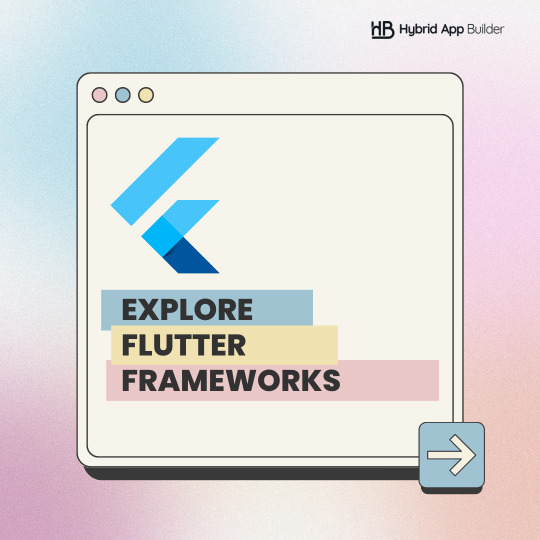





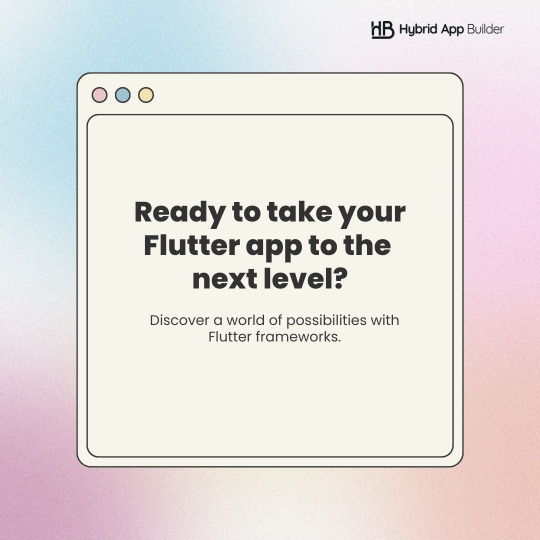
🚀 Ready to take your Flutter development to the next level?
🔥 Check out our top picks for Flutter frameworks and take your app to new heights! 📱
3 notes
·
View notes
Text
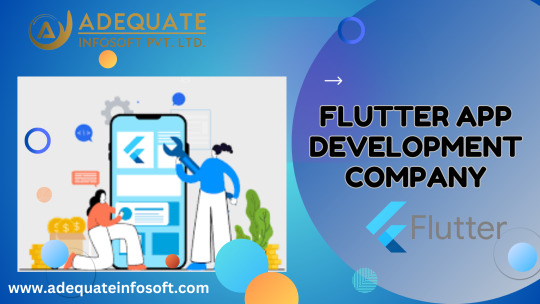
Welcome to Adequate Infosoft, your premier destination for Flutter app development solutions. We are a cutting-edge software development company specializing in creating high-quality and innovative mobile applications using Flutter, the popular cross-platform framework developed by Google.
2 notes
·
View notes
Text
How XcelTec Can Help With Best Flutter App Development Services?

Cross-platform app development tool Flutter helps developers balance productivity and quality. Applications developed for mobile platforms using Flutter provide a number of benefits and accelerate application development. A few key components in the development of Flutter applications are listed below:
Single-Based Coding
Broad Widget Library
Upgraded User Experience
Material Design and Cupertino
Dart Advantages
Best Flutter App Development Services by XcelTec;
As the leading provider of Flutter app development services, XcelTec offers a range of Flutter App Development offerings that have aided clients all over the world in reaching the zenith of their development. Our unrivalled and incredibly dependable Flutter application engineers assist companies in creating cross-platform native interfaces of the highest calibre.
We fully utilise the advancing technology to provide a WOW experience. Additionally, we promise that the most skilled Flutter developers will support your application with the best work available in the industry. To have a lasting impact on our knowledgeable, existing clients, we provide a unique range of Flutter app development features, which include:
UI/UX Design
Dart App Development
Flutter Development for iOS and Android
Front-end and Backend Development
Flutter Cross-platform Development
Testing and QA Solutions
Application Migration and support
Visit to explore more on How XcelTec Can Help You With The Best Flutter App Development Services?
Get in touch with us for more!
Contact us on:- +91 987 979 9459 | +1 919 400 9200
Email us at:- [email protected]
#flutter app development#flutter app development company#flutter app#flutter development#flutter development services#hire mobile app developer
2 notes
·
View notes
Text
#it services#it company#web design#flutter development#It training company#IT training institute#ui ux design course#ui ux course#web development#Web development training institute in Surat#Web development training institute#Flutter development training institute#software development#app development#software solutions#web design in institute#training institute#training company
2 notes
·
View notes
Text
The Flutter Revolution: Progress and Innovation in the Last Three Years
This blog is about ,In three years, How Flutter has redefined cross-platform development with powerful tools, expanded platform support, and community-driven innovation.
https://kretoss.com/the-flutter-revolution-progress-and-innovation-in-the-last-three-years/

0 notes
Text
Flutter development companies are shaping the future of cross-platform app creation in 2025. These top 11 companies excel in providing scalable, innovative, and cost-effective solutions, making them the ideal partners for businesses looking to achieve digital success. Read more.
0 notes
Text
Is Explainable AI Explainable Enough Yet?

Nowadays, AI is an unchangeable component that influences choices in various spheres of life including health, finance, security, and entertainment. Explainable AI is however as understandable as it is convenient for us to make it to be. Thus, let us proceed to further discussion of the problem in question by focusing on the nature and the difficulties of explainable AI decisions.
Is Explainable AI Truly Transparent? Unveiling the Truth Behind AI Interpretability
Explainable AI is all about the ability to look inside the system and understand it from the inside. The main idea of this approach is that those who make decisions, that might be financial analysts, physicians, or attorneys, should be able to comprehend the equations through which an artificial intelligence model arrives at a specific decision. However within this specific context, one must define: what does ‘explainable’ mean?
The degree of transparency varies with the AI model's complexity. Due to their easily traceable logic, simple machine learning models such as decision trees and linear regressions are by nature easier to interpret. However, the transparency begins to decrease with increasingly sophisticated models, like deep learning neural networks. These models include a lot of layers and parameters; thus, it is hard to dissect their decision-making processes into manageable parts. Explainability techniques are useful in this situation, but they cannot be used without restrictions.
Can We Trust AI? The Quest for True Explainability in Machine Learning
The trust issue is crucial to AI Explainability. When we trust an AI system, we are putting our faith in it to act in a predictable, equitable, and comprehensible manner—especially when it comes to crucial domains like criminal justice or medical diagnostics. Human stakeholders must be able to understand AI's reasoning behind specific forecasts or classifications for trust to be fully established.
Even though there are several approaches available to improve the interpretability of AI, such as LIME (Local Interpretable Model-agnostic Explanations) and SHAP (Shapley Additive Explanations), these are far from ideal. They provide estimates of the process a model went through to arrive at a specific outcome, but they do not necessarily offer a precise explanation. Therefore, even though these methods can make AI actions relatively comprehensible, the question still stands: are these justifications thorough enough to promote real trust?
The Mystery of Explainable AI: Is It Really Clear Enough for Everyone?
Being understandable by an extensive variety of individuals—from data scientists to end users with little to no technical expertise—is one of Explainable AI's main problems. The public's ability to understand the explanations produced by explainable AI models is typically limited since they require a certain degree of technical knowledge. For example, a patient receiving a diagnosis from an AI-driven diagnostic tool might not understand the model's output, but a doctor working with the tool might.
An additional problem raised by this knowledge gap is: To whom should the AI explain itself? Should it aim for complete common understanding or should it focus on subject experts? Maintaining a balance between the two is still one of Explainable AI's biggest challenges.
Why Explainable AI May Still Be a Black Box: A Deep Dive Into AI Transparency
Some frameworks can stay "black boxes" even with Explainable AI. Deep neural networks in particular are complex models with an infinite number of variables and sophisticated connections. It is difficult to explain these models' behaviour to a human audience because of their extreme depth as well as complexity. Several researchers believe that because of the way they develop complexity, some forms of AI, like those adopted in deep learning, may never be fully understood.
Furthermore, there are philosophical concerns that arise frequently in the field of AI explainability, such as whether an AI can be trusted if every decision it makes can be fully explained. When it comes to, say, identifying medical outcomes, should we demand full transparency from AI if doing so would restrict its value to scenarios where AI has shown to be more accurate than human decision-makers?
Explaining AI: How Close Are We to Achieving Full Transparency?
Complete transparency is still a faraway goal with Explainable AI's improvements. Rather than accurate representations of the model's decision-making process, the explanations given frequently use simplifying summaries or estimates. Although these justifications have their uses, they frequently fall short of offering the level of clarity required to understand sophisticated AI systems.
Researchers and developers are working to improve the ability to be understood as AI develops further. Though still in their beginnings, new tools and structures are being developed to offer deeper insights into the workings of systems. Achieving complete transparency in AI requires striking a balance between complexity, accuracy, and interpretability in addition to other challenges related to technology.
Conclusion
Undoubtedly, Explainable AI is a positive development that addresses growing issues about the reliability, equity, and responsibility of AI systems. But as it stands at present, not all audiences find Explainable artificial intelligence to be "explainable enough." Without sacrificing the efficiency of AI models, the area must continue to advance to offer explanations that are more understandable and easily accessible.
Keeping these artificial intelligence devices trustworthy while also comprehending their decision-making processes will be a major problem as we advance. This will include maintaining a balance between the complexity of AI systems and the requirement for transparency.
#angular#web development#website design company#website development company#app development#flutter app#flutter development#flutter app developer
0 notes
Text
Welcome to Amron Software, your partner for cutting-edge web solutions, mobile applications, and cloud services. We specialize in website design and development, WordPress, Flutter, and more, ensuring a strong online presence for your business. Our expert team delivers customized enterprise solutions globally, tailored to individuals and businesses alike. Whether you're looking for high-quality websites, e-commerce platforms, mobile apps, or corporate branding, Amron Software turns your ideas into reality.
Services We Offer:
Web Design & Development
Mobile App Development (Android & iOS)
Ecommerce Solutions
Flutter Development
SEO & Social Media Marketing
Contact Us Today
#Web Design & Development#Mobile App Development (Android & iOS)#Ecommerce Solutions#Flutter Development#SEO & Social Media Marketing
0 notes
Text
Award-Winning Mobile App Development Company | Mobulous Technologies
Mobulous Technologies is a leading mobile app development company in India, offering cutting-edge mobile solutions for businesses worldwide. From iOS to Android and Flutter, our team of experts specializes in creating custom mobile apps that help businesses grow. Get in touch with Mobulous Technologies for top-quality mobile app development services and bring your idea to life today!
#Mobile app development#iOS app development#Android app solutions#Flutter development#custom mobile apps#app development services
1 note
·
View note
Text
Discover Quokka Labs' expertise in Flutter app development. We create high-performance, cross-platform mobile applications using Flutter's powerful framework. With a single codebase, we ensure faster development and seamless experiences across iOS and Android. Our skilled developers leverage Flutter's capabilities to deliver responsive, scalable, and cost-effective solutions tailored to your business needs.
#flutter for app development#flutter development#flutter app developers#flutter application development#flutter#mobile app development company in india#mobile applications development#app development#mobile app development#mobile app development company#android app development#app developing company
0 notes
Text
50% Increase in User Engagement - The Power of Flutter for a Startup App!
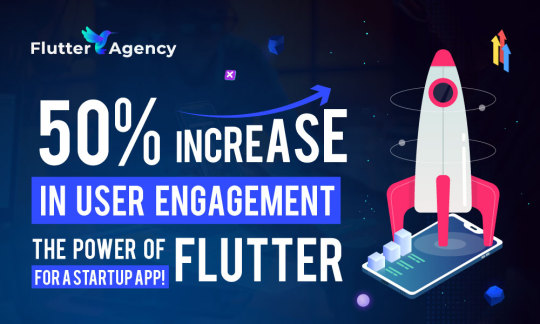
Discover how Flutter boosted user engagement by 50% for a startup app. Learn the impact of Flutter's power in transforming app performance and user retention.
0 notes
Text
The Ultimate Guide to Integrating AI Features in Your Flutter Apps

As technology quickly evolves, incorporating artificial intelligence (AI) into mobile applications has become essential for providing superior user experiences, unique content, and cutting-edge features. Flutter App Development, with its robust ecosystem and cross-platform app development capabilities, is an ideal framework for developing AI-enhanced apps. This guide will walk you through the steps and best practices for integrating AI features into your Flutter applications.
1. Introduction to AI in Mobile Apps: Artificial intelligence is transforming how mobile applications interact with users. AI enables apps to offer intelligent features like voice approval, image processing, personalized options, and project analytics, all of which in particular enhance the user experience and engagement.
2. Why Choose Flutter for AI Integration?: Flutter, Google's open-source UI software development toolkit, is well-known for its Flutter app development company, expressive UI, and native performance on both iOS and Android platforms. Here are a few reasons why Flutter is perfect for AI integration:
Cross-Platform Development: Develop once, deploy anywhere.
Rich Ecosystem: Access a wide array of plugins and packages.
Hot Reload: Instantly see the results of your code changes.
Strong Community Support: Benefit from an active developer community and extensive documentation.
3. Getting Started with AI in Flutter: Before diving into AI integration, it's crucial to have a solid understanding of Flutter's development. Here’s a quick checklist:
Set up your Flutter development environment.
Get familiar with the Dart programming language.
Explore Flutter’s widget tree and state management.
4. Popular AI Features in Flutter Apps
Here are some common AI features you can integrate into your Flutter apps:
Voice Recognition: Convert speech to text and vice versa.
Image Processing: Recognize objects, faces, and scenes.
Natural Language Processing (NLP): sentiment analysis, language translation, and chatbots.
Predictive Analytics: Provide personalized recommendations and forecasts.
5. Setting Up Your Development Environment
To begin integrating AI into your Flutter app, you need the following:
Flutter SDK: Install the latest version from the Flutter website.
Dart SDK: Included with Flutter.
IDE: Use Visual Studio Code, Android Studio, or IntelliJ IDEA.
AI Libraries and Packages: TensorFlow Lite, Google ML Kit, etc.
6. Integrating Pre-built AI Solutions
For rapid development, consider using pre-built AI solutions:
Google ML Kit: A collection of machine learning APIs for mobile apps.
TensorFlow Lite: A lightweight solution for deploying ML models on mobile devices.
IBM Watson: Advanced AI and Machine Learning APIs.
7. Testing and Deployment
Thoroughly test your AI features before deployment:
Unit Testing: Test individual components and functions.
Integration Testing: Ensure AI features work seamlessly with other app components.
Performance Testing: Monitor the performance impact of AI features.
Deploy your app using Flutter’s built-in tools for both iOS and Android.
8. Future Trends in AI and Flutter
Stay ahead by keeping an eye on emerging trends:
Edge AI: running AI models directly on mobile devices for real-time performance.
AutoML: automated machine learning tools that simplify the model training process.
Explainable AI: Making AI decision-making processes transparent and understandable.
Conclusion
Embrace the Future of Mobile App Development with Flutter
Flutter continues to improve the mobile app development landscape, offering outstanding benefits that businesses can't afford to ignore. As more companies shift towards this impressive cross-platform architecture, now is the perfect time to join them. For your next project, trust XcelTec, the leading Flutter app development company, to bring your vision to life.
#flutter app development#flutter app development company#flutter app#flutter development#flutter development services#best flutter app development services
0 notes
Text
React Native vs Flutter: Which is Better for Your Next Project?
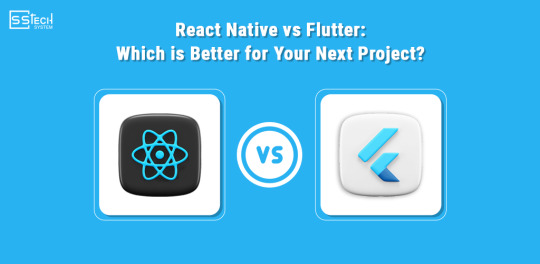
Mobile app development is a fast-changing sector where corporations and developers seek the finest and most effective ways to create great applications. As part of this effort, cross-platform mobile app development lets developers construct iOS and Android apps with a single codebase. Two of the most popular mobile app frameworks are React Native and Flutter.
Facebook’s React Native lets developers build native mobile applications using React and JavaScript. Since its 2015 inception, its ease of use, substantial community support, and ability to connect with native components have earned it a loyal following.
In contrast, Google launched Flutter in 2017 as a comprehensive toolset for developing fast, beautiful apps using Dart. Its widget-based architecture allows platform uniformity and customization.
React Native vs Flutter is compared in performance, UI, development speed, cost, and developer availability. This article compares these characteristics to help you pick the best framework for your next mobile app project. Knowing the pros and cons can help you pick intelligently and according to your initiative’s goals.
What Is React Native?
Facebook created the mobile app framework React Native. With it, developers may create natively displaying mobile applications with React and JavaScript. The effectiveness and simplicity of usage of React Native have made it very popular since its 2015 debut.
What Is Flutter?
Google, however, developed the mobile app development framework Flutter. It was introduced in 2017 and offers a complete toolkit for creating aesthetically pleasing and efficient applications using the Dart programming language.
React Native Vs Flutter
The rise of mobile applications changed development. Mobile app development demands faster, easier methods due to over 3.6 billion mobile users. Two hybrid app development frameworks remain Flutter and React Native. Both are becoming more popular.
1. React native vs flutter- Performance
React Native connects native components with JavaScript code, bridging the gap between online and mobile platforms. Sometimes, especially with intricate animations or demanding high performance, this might cause performance problems. Still, upgrades and improvements are making React Native for iOS and Android development better every day.
Flutter’s direct compiler to native ARM code delivers great performance. Its lack of need for bridges or intermediate code representations lowers the overhead in terms of performance. Rich customizable widgets in Flutter also guarantee seamless performance on various devices.
2. React native vs flutter -UI
React Native draws its UI components directly from the platform’s native components. A wide range of customizable widgets offered by Flutter guarantees consistency by appearing the same on all platforms.
Flutter comes with additional customizing and flexibility choices by default. Its design is built on widgets, which enables a very expressive and customizable user interface. Although it may provide comparable effects, React Native often needs more work and depends on other libraries for comprehensive modifications.
3. React native vs flutter development – Speed
React Native gains from the large JavaScript ecosystem and the hot-reload capability, which expedites development and debugging. Although Flutter also allows hot-reload, sometimes the development process may be made much easier by its extensive widget library. Developers often discover Flutter’s extensive documentation and pre-built UI component solutions, which may result in quicker development times than React Native.
4. React native vs flutter – Cost
A bigger pool of JavaScript engineers generally helps React Native and lowers recruiting expenses. Flutter engineers may be paid more because they work with specialized Dart language and relatively newer technologies.
While React Native’s dependence on native modules may need more maintenance work, Flutter’s consistent performance across several devices might eventually save debugging and maintenance expenses.
5. React native vs flutter- Developers
Usually having worked in web development, react native developers are conversant with JavaScript and React. Locating qualified developers for your project is made simpler by the detailed documentation and strong community support.
Dart is a language that is becoming increasingly popular but still less common than JavaScript hence Flutter developers must know it. However, the number of knowledgeable Flutter developers is quickly rising due to the increasing interest in the technology.
Which is better, Flutter vs. React Native in 2024?
Project needs, team experience, and long-term objectives are just a few considerations for determining which is better, Flutter vs. React Native in 2024.
Performance: Because Flutter is compiled directly, it often offers better performance.
UI consistency: Flutter uses configurable widgets to provide a consistent user interface on all platforms.
Developer availability: Hiring may be made easier by the bigger skill pool of React Native.
Development speed: Fast development is possible with both, but Flutter’s extensive widgets make UI building easier.
By 2024, Flutter will still be a hot competitor for many new projects because of its performance and expanding community.
When using React Native
If React and JavaScript are already second nature to your team.
When having access to several libraries and modules and needing a fast start.
For projects where you can use native modules, speed is necessary but not essential.
When using Flutter
This is for applications that need smooth animations and great performance.
When you want a consistent user interface on all platforms.
This is for projects that depend on speed enhancements and the newest technologies.
Mobile app development technologies
React Native and Flutter are the cutting edge of mobile app development technology. Though their decision depends on the project requirements and developer experience, they both provide strong tools to build excellent apps.
Organization flutter development
Selecting a Flutter development company will enable you to use Flutter fully. These organizations are experts in the mobile Flutter platform and can produce aesthetically pleasing, high-performing apps.
Web application development
The abilities gained in React Native may be readily applied to React for web application development for companies interested in developing both mobile and online applications. Flutter also extends its capabilities into web development, offering a consistent way to create cross-platform apps.
React native app development company
Using the whole potential of the React ecosystem, working with a React Native app development company will provide you access to skilled developers who can finish your app concept fast.
Android app development
Both frameworks will serve Android app development. While Flutter provides excellent speed and device consistency, React Native combines well with native Android components.
Flutter development tools
Flutter development tools streamline the development process with many libraries, widgets, and plugins. Building, debugging, and optimizing your apps is made simpler with tools like Flutter DevTools, Dart Analyzer, and other IDE extensions.
Cross-platform development
Both React Native and Flutter are excellent at cross-platform development. They provide a constant user experience and save time and money by enabling developers to create code once and distribute it across several platforms.
UI/UX development
Any mobile app project has to include UI/UX development. With its extensive design tools and configurable widgets, Flutter shines here. React Native also has strong UI/UX capabilities, especially with other frameworks.
Conclusion
Your project needs and long-term objectives will ultimately choose which of React Native and Flutter to use. For applications using JavaScript and current web technologies in particular, React Native is a mature and trustworthy choice. For projects that value performance and customizability across many platforms, Flutter, on the other hand, provides outstanding performance and a unified UI development experience.
Whichever framework you choose—Flutter vs React Native—offers strong options for developing contemporary mobile apps. Analyze your particular requirements, consider your development team’s experience, and choose the framework that most closely fits your project objectives. Successful apps in the always-changing field of mobile app development frameworks depend on remaining knowledgeable and flexible.
#React Native and Flutter#sstech system#web development#mobile app development#cross platform#framework#UI/UX development#Android app development#ios app development#Flutter#React Native#app development frameworks#Flutter development#React native
1 note
·
View note